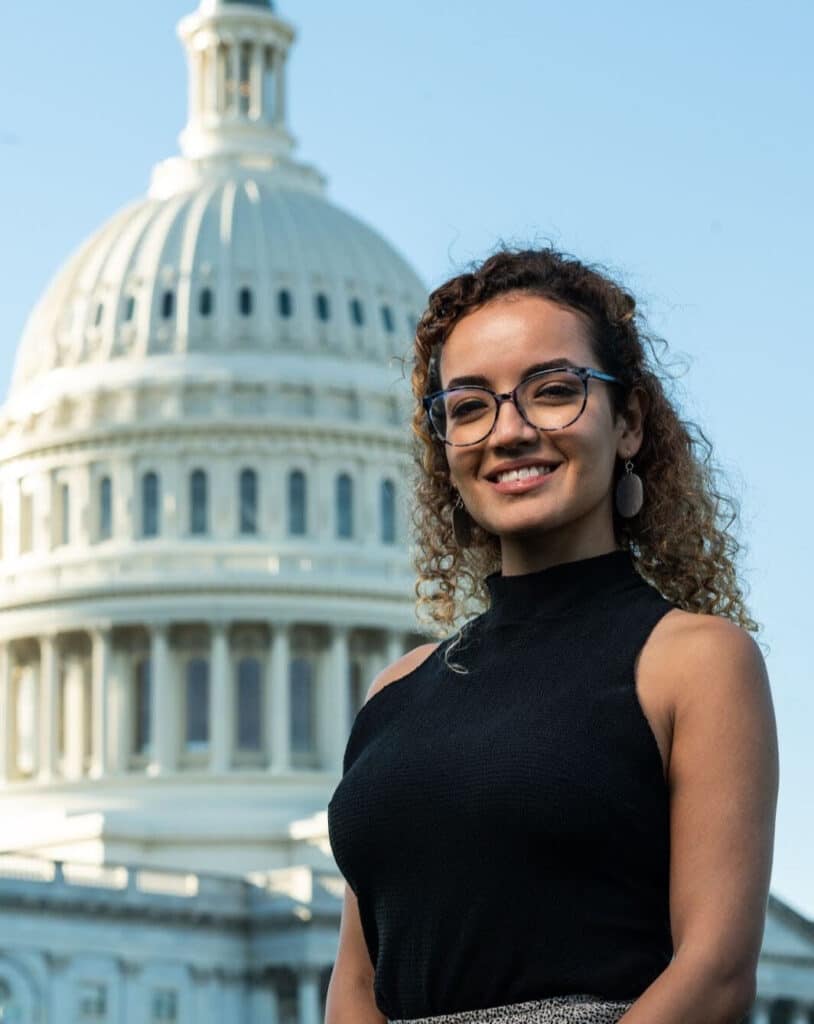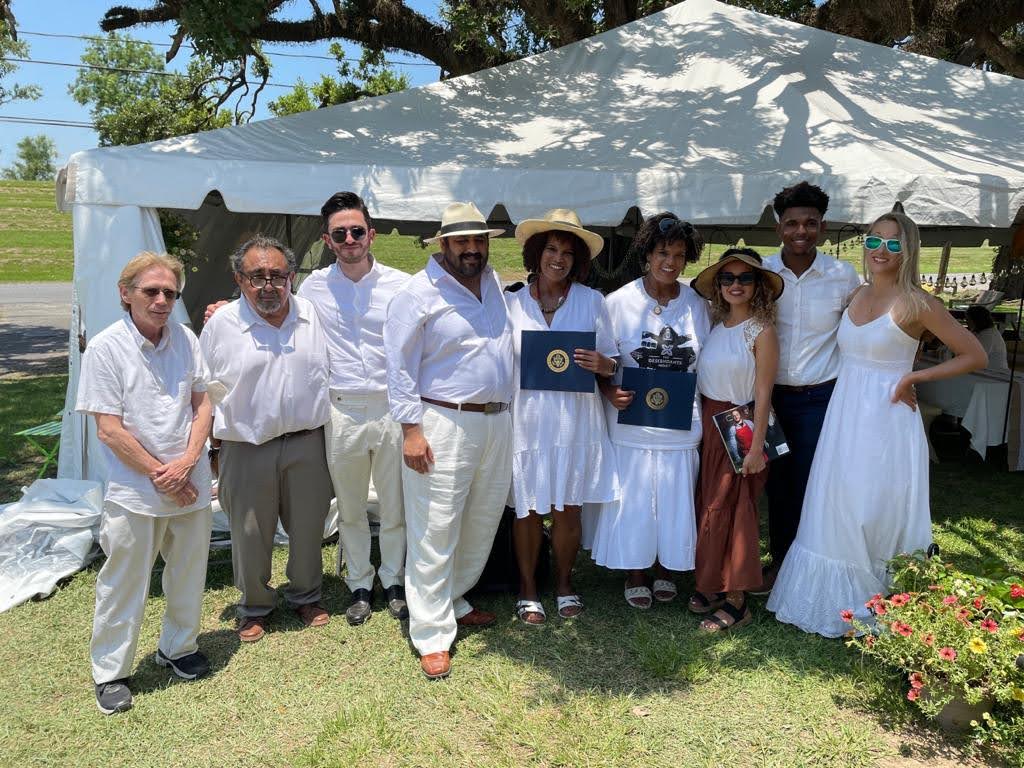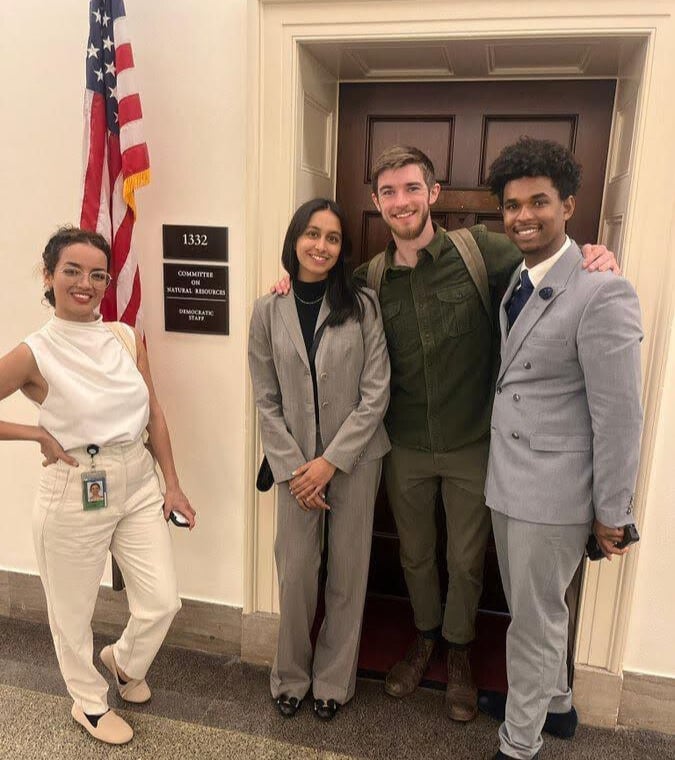
By Marilyn Zepeda
Marilyn Zepeda serves as the Public Engagement Director for the House Committee on Natural Resources Democrats. She leads stakeholder engagement on issues that fall under the jurisdiction of the Committee, to bridge the gap between the communities and policymaking. She also works to uphold community-led policy efforts and solutions, coordinate in-field engagement activities, and maintain consistent and open communication with stakeholders. She has worked on the groundbreaking A. Donald McEachin Environmental Justice for All Act and other legislation that supports vulnerable communities. She has been part of the Grijalva family since 2016. She has a bachelor’s degree in Translation and Interpretation in Spanish, English and Portuguese, as well as a degree in Neurolinguistics from the University of Arizona.
Q: Can you share your career path to becoming a congressional staffer?
A: My journey to becoming a congressional staffer was not typical. I was offered the opportunity to work in a district office after I graduated college. I had moved back to my country, Mexico, so I was not living in the U.S. at the time. I accepted the job offer and I worked there for two years. During my time as a caseworker, I saw many loopholes within legislative text when trying to help constituents navigate federal agencies. That motivated me to work to fix broken policy.
Then, I moved to DC which was a big transition for many reasons. There was a big language barrier since I didn’t speak English fluently and I experienced culture shock. I faced many challenges as a woman of color with an accent, especially during the previous presidential administration when I was constantly asked to leave meetings because of my identity. Encountering that confrontation from White men specifically was very insulting, but it just made me want to prove them wrong.
I am very lucky to be able to work with a member of Congress who fosters the next generation of leaders, even when I didn’t believe in myself, Congressman Raúl M. Grijalva did and I’m now able to represent his district very proudly. Working in Congress has taught me to be resilient and proud that people like me belong in the halls of this institution. It has been a hard but rewarding journey to create justice and equality-based solutions and be a voice for people who are not able to be here.
Q: Why is it crucial to include and uplift the voices of women of color in the halls of Congress and in the environmental policymaking process?
A: Historically, women and girls have been the least thought of when societal decisions are made but are the most impacted and vulnerable. We know that wars, climate degradation, and political conflicts push more women and girls into poverty, danger, and hunger. The UN estimates that by 2050, climate change will push up to 158 million more women and girls into poverty and lead 236 million women into hunger.
A recent study shows exposure to heat, particulate matter, wildfires, and floods contributes to miscarriages, preterm birth, low birth weights, and other poor pregnancy and birthing outcomes. Proper nutrition is vital during pregnancy and breastfeeding, yet women are also disproportionately likely to face the consequences of unstable food production and distribution exacerbated by climate degradation.

For these reasons, it is crucial to include and uplift women of color in the halls of Congress and in the environmental policymaking process because we bear the brunt of many challenges. The more we are left out of decision-making, we will continue to be oppressed. Women of color are also natural leaders, healers, nurturers, and problem-solvers. We live the issues profoundly and when given the platform (or without one) we create justice-based solutions for everyone. We don’t leave anyone behind. We know what it feels to be in the fight, what it feels like to be sidelined, so we use that momentum to show up and show up for everyone else.
Moreover, even though environmental justice is becoming a mainstream movement, women of color are still being left out of the picture. There are a lot of women and people of color who are not considered when addressing environmental justice. Working with people of color has become like checking a box for some people, instead of including us in the process.
And yes, that is not something everyone knows how to do if you have never been exposed to working with communities of color. But if you’re using our voices, our stories of struggle, to make awareness of the things we face, then you can also make an effort to listen to us and understand us. We know what is on the ground, and we also have the solutions to them. We are willing to teach you if you are genuine.
Q: Do you have any advice for women interested in pursuing a career in policy?

A: My advice is to not take for granted what you’re doing now because somebody is paying attention. If you’re going to a happy hour or a networking event, act like those people you are talking to are going to be your next boss. People are paying attention, that’s what happened to me.
Secondly, a lot of women make themselves “little” to fit into certain spaces. I hope that when you feel like you don’t fit in, you remember you do belong there. And even if you don’t fit in, you’ll create a space for you and other women to be there. It’s not always easy, but it can be very empowering to set a foundation for others to be a part of.
And for people who come from different cultures, you don’t need to change in any way or form who you are. Stand up with all of yourself: your culture, your accent, your community, and show up. Don’t forget where you come from!